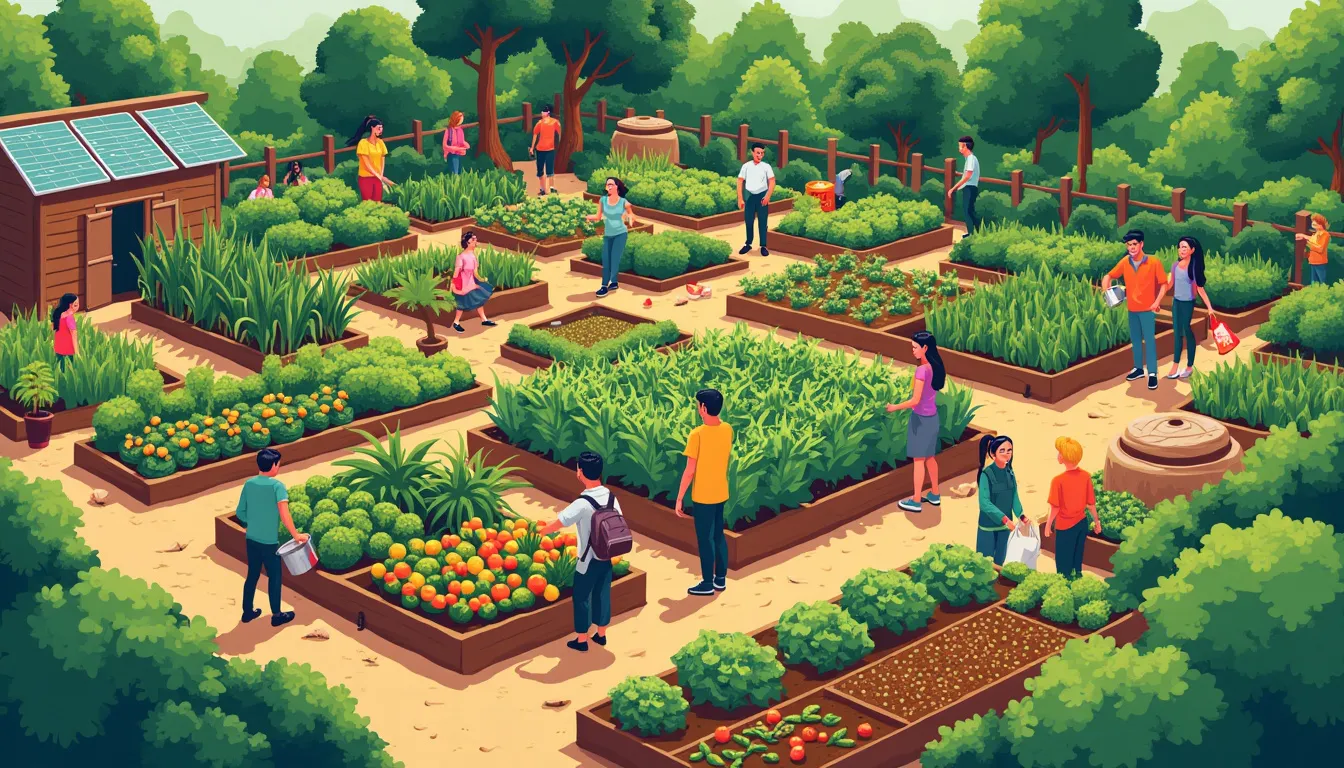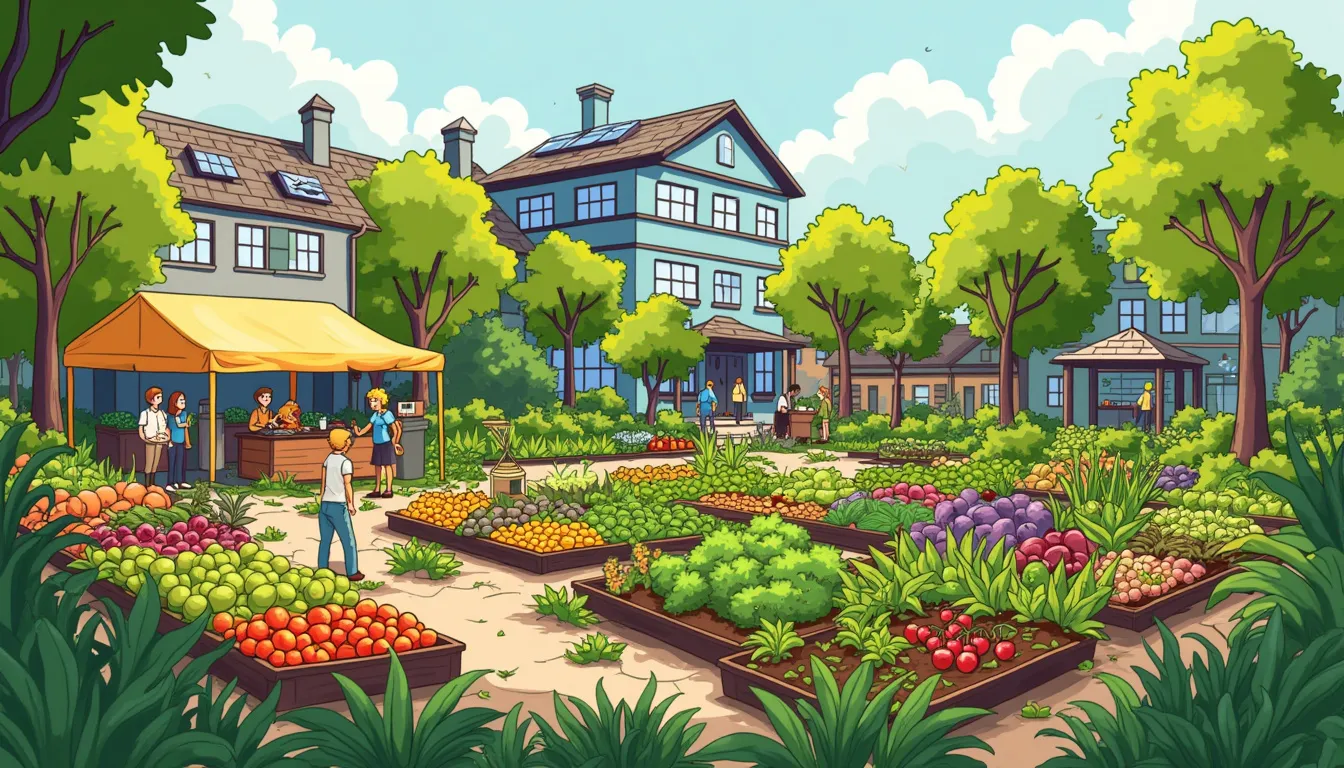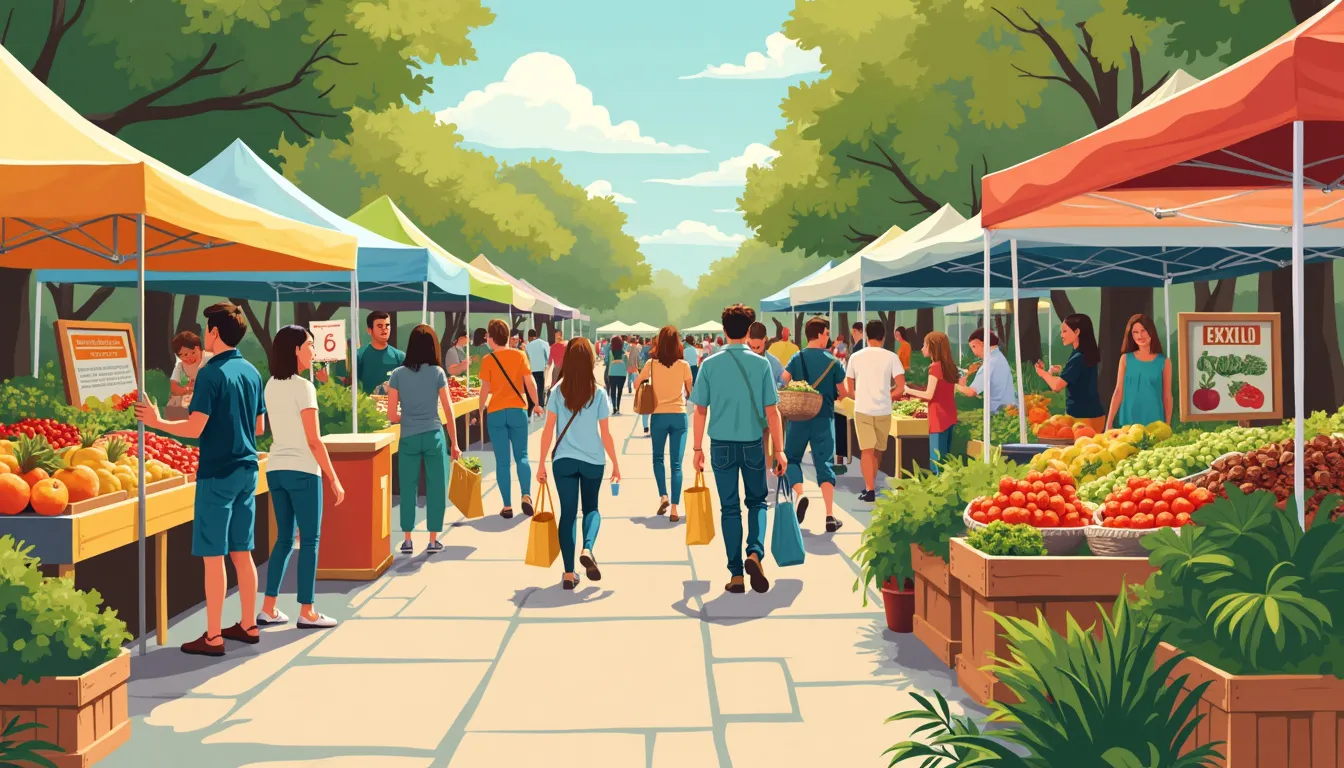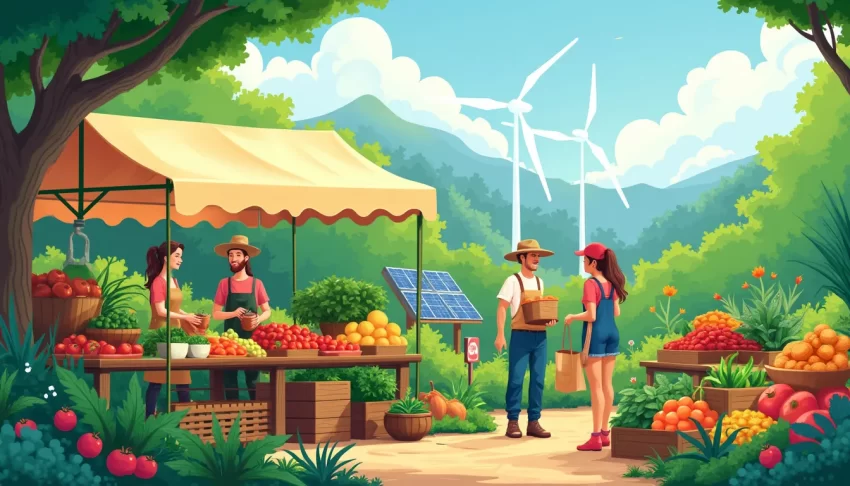In a world where climate change, environmental degradation, and health concerns are becoming increasingly pressing, the concept of sustainable food has emerged as a beacon of hope and innovation. Sustainable food refers to the production, distribution, and consumption of food in ways that are ecologically responsible, economically viable, and socially just. This approach to food is not simply a trend but a necessary evolution toward ensuring the well-being of our planet and future generations.
The importance of sustainable food cannot be overstated. It touches multiple facets of our lives—from the health of our environment to our personal well-being and the vitality of our communities. As awareness grows about the impact of traditional food systems, more people and businesses are turning towards sustainable food practices. This shift is not just about eating better; it’s about fostering a food system that respects the planet’s resources and promotes equity and health for all.
The rise of sustainable food practices is fueled by a powerful combination of innovation and grassroots movements. Individuals are making more informed choices, local farmers are adopting eco-friendly practices, and businesses are increasingly held accountable for their environmental footprints. The journey of sustainable food is an inspiring story of how every decision, whether it’s choosing organic produce at the grocery store or supporting farm-to-table restaurants, contributes to a larger, sustainable narrative.
As we delve deeper into the benefits and practices of sustainable food, and explore the steps toward a greener future, we will uncover how each of us can play a role in this vital movement. Whether you are an individual looking to make healthier, more sustainable choices, or a business owner aiming to integrate eco-friendly practices, the path to a greener future is paved with conscious, sustainable food choices. Let’s embark on this journey together, one bite at a time.
The Rise of Sustainable Food: A Path to a Greener Future
Introduction to Sustainable Food
In today’s rapidly changing world, the concept of sustainable food has become more critical than ever. But what exactly is sustainable food? In its essence, sustainable food refers to the production, processing, distribution, and consumption of food in ways that have minimal environmental impact, support local economies, promote animal welfare, and ensure social equity. It’s food that is grown, harvested, and distributed with both the health of people and the planet in mind.
The importance of sustainable food cannot be overstated. As our global population continues to grow, so does our demand for food, which puts enormous pressure on our natural resources. Traditional farming and food production methods are major contributors to environmental issues, such as deforestation, loss of biodiversity, and greenhouse gas emissions. By embracing sustainable food practices, we can help mitigate these effects and work towards a healthier planet.
Over the past few decades, there has been a significant rise in sustainable food practices. This shift is driven by a growing awareness of environmental issues, concerns over health and food safety, and a desire to support local economies. People are increasingly interested in where their food comes from and how it is produced, leading to a broader adoption of sustainable practices. Whether it’s through the growth of organic farming, the popularity of farm-to-table initiatives, or the increasing availability of plant-based options, sustainable food is becoming a mainstream movement.
One inspiring story is the transformation of the fishing industry in the small coastal town of Newlyn in Cornwall, England. Faced with declining fish stocks and an uncertain future, the local community rallied together to adopt sustainable fishing practices. By implementing quotas and promoting less invasive fishing techniques, they not only revived their marine ecosystem but also secured their livelihoods. This grassroots effort showcases the power of collective action in driving sustainable food initiatives.
Sustainable food is not just a trend; it’s a necessity. Investing in sustainable food practices benefits everyone – from consumers and producers to ecosystems and economies. By understanding the importance and impact of sustainable food, we can make more informed choices that lead to a healthier, more sustainable future. In the next sections, we will explore the myriad benefits of sustainable food, examine prominent sustainable practices, and offer practical steps for individuals and businesses to contribute to a sustainable food future.

Benefits of Sustainable Food
As the world becomes increasingly aware of the need for sustainable practices, the benefits of sustainable food are more evident than ever. Embracing sustainable food can lead to profound changes on multiple fronts, including environmental, health, and economic impacts. Let’s delve into these advantages and see how they contribute to a greener future.
Environmental Benefits
One of the most compelling reasons to adopt sustainable food practices is the significant positive impact on the environment. Sustainable food production methods prioritize reducing the carbon footprint, preserving biodiversity, and maintaining ecological balance.
For instance, conventional agricultural practices are major contributors to greenhouse gas emissions. According to the Food and Agriculture Organization (FAO), agriculture, forestry, and land use contribute approximately 21% of global greenhouse gas emissions. By contrast, sustainable farming techniques, such as crop rotation, organic farming, and agroforestry, enhance soil health, sequester carbon, and diminish reliance on synthetic fertilizers and pesticides. These methods significantly reduce emissions and help in mitigating climate change.
Additionally, sustainable food practices help in preserving biodiversity. Monoculture farming, prevalent in conventional agriculture, depletes soil nutrients and contributes to the loss of plant diversity. On the other hand, practices like polyculture and permaculture protect a wide range of species and contribute to resilient ecosystems. This biodiversity is crucial for ecosystem balance, ensuring pollination, disease resistance, and overall agricultural productivity.
Health Benefits
Beyond environmental advantages, sustainable food has substantial health benefits. Sustainable food is often synonymous with organic and chemical-free food, reducing consumers’ exposure to potentially harmful pesticides and genetically modified organisms (GMOs).
Consuming sustainable food can lead to a nutrient-rich diet. Studies, including those highlighted by Harvard T.H. Chan School of Public Health, have shown that organic fruits and vegetables tend to have higher concentrations of beneficial antioxidants. These antioxidants play a crucial role in fighting oxidative stress and may reduce the risk of chronic diseases such as heart disease and cancer.
Moreover, chemical-free practices align with the reduction of antibiotic-resistant bacteria. The World Health Organization (WHO) has raised alarms about the overuse of antibiotics in conventional livestock farming, which can lead to the development of antibiotic-resistant bacteria, posing a significant threat to public health. Sustainable livestock practices prioritize animal welfare and minimize the use of antibiotics, contributing to a more secure food system.
Economic Advantages
The shift to sustainable food also brings economic benefits, particularly at the local level. Supporting sustainable food often means supporting local farmers and producers who use eco-friendly methods.
By purchasing locally produced sustainable food, consumers help to bolster local economies. Buying directly from farmers’ markets, community-supported agriculture (CSA) programs, or farm-to-table establishments ensures that more money stays within the community. Local food systems often result in fresher, higher-quality products and reduce the carbon footprint associated with long-distance transportation.
In addition to supporting local economies, sustainable food practices can lead to significant reductions in food waste. The United Nations Environment Programme (UNEP) estimates that about one-third of all food produced globally is wasted. This wastage contributes to significant economic losses. Sustainable food systems focus on efficiency, using comprehensive approaches like improved storage techniques and community food-sharing programs to minimize waste.
Businesses adopting sustainable food practices can also benefit from enhanced brand reputations and customer loyalty. Consumers are increasingly prioritizing sustainability in their purchasing decisions. A survey by Nielsen found that 73% of global consumers would definitely or probably change their consumption habits to reduce their environmental impact. Companies that align themselves with sustainable practices can capture this growing market, setting themselves apart from competitors.
In essence, the adoption of sustainable food practices offers a trifecta of benefits: environmental protection, improved health outcomes, and economic gains. By embracing these practices, we can collectively pave the way toward a greener, healthier, and more prosperous future.

Prominent Sustainable Food Practices
When we talk about sustainable food, it’s essential to understand the various practices that contribute to this concept. These practices not only support the environment but also promote better health and strengthen local economies. Here, we will delve into some of the most prominent sustainable food practices: organic farming, plant-based diets, farm-to-table initiatives, and sustainable seafood practices.
Organic Farming
Organic farming is a cornerstone of sustainable food practices. This method avoids synthetic chemicals, pesticides, and genetically modified organisms (GMOs). Instead, it focuses on natural processes and biodiversity to maintain soil fertility and manage pests.
A real-world example of the success of organic farming is the Rodale Institute in Pennsylvania. For over 70 years, they have proven that organic farming can be just as productive, if not more so, than conventional methods. According to a study by the Institute, organic farming yields more nutritious foods and retains more carbon in the soil, which helps combat climate change.
But how does this translate to your everyday life? When you purchase organic produce, you’re directly supporting farming methods that are kinder to the earth and healthier for you. Plus, research shows that organic foods often contain higher levels of certain nutrients, such as antioxidants, compared to their conventionally grown counterparts.
Plant-Based Diets
Adopting a plant-based diet is another highly effective sustainable food practice. This doesn’t necessarily mean eliminating animal products entirely but rather focusing on reducing consumption. Plant-based diets are linked to lower greenhouse gas emissions, reduced land use, and decreased water consumption.
Consider the example of the Meatless Monday campaign, which encourages people to skip meat one day a week. This initiative has had a massive impact on reducing meat consumption globally. The production of plant-based foods generally requires fewer resources than animal-based ones. For instance, producing one kilogram of beef can require up to 15,000 liters of water, while the same amount of vegetables might only require 300 liters.
Moreover, plant-based diets come with health benefits like lower risks of heart disease, hypertension, and Type 2 diabetes. By integrating more plant-based meals into your diet, you contribute to a more sustainable food system and improve your health.
Farm-to-Table Initiatives
Farm-to-table is more than just a dining trend; it’s a sustainable food practice that emphasizes sourcing food directly from local farms. This practice supports local economies and reduces the carbon footprint associated with long-distance food transport.
An inspiring story comes from Blue Hill at Stone Barns, a restaurant and farm in New York. Chef Dan Barber has popularized the idea of farm-to-table dining by showcasing how delicious and sustainable local, seasonal foods can be. By sourcing ingredients directly from nearby farms, the restaurant reduces food miles, minimizing the environmental impact.
For individuals, visiting local farmers’ markets or subscribing to a community-supported agriculture (CSA) program can be excellent ways to adopt the farm-to-table philosophy. Not only do you get fresher and often more flavorful produce, but you also support local farmers who are more likely to employ sustainable farming practices.
Sustainable Seafood Practices
The oceans cover more than 70% of our planet, yet they are often overlooked when discussing sustainable food. Overfishing and destructive fishing practices have put immense pressure on marine ecosystems. Sustainable seafood practices aim to manage and protect marine environments while ensuring that we still have fish for future generations.
Marine Stewardship Council (MSC) is a leading organization that certifies sustainably caught seafood. By looking for the blue MSC label, consumers can make informed choices that contribute to the health of our oceans. For example, the Alaska pollock fishery, one of the largest in the world, is MSC-certified and employs practices that avoid overfishing and protect ocean habitats.
Additionally, aquaculture (fish farming) can be done sustainably. Innovative methods, like integrated multi-trophic aquaculture (IMTA), where different species like fish, shellfish, and seaweed are farmed together, can minimize environmental impact and create a balanced ecosystem.
At home, focusing on buying sustainably sourced seafood and diversifying your seafood choices can make a big difference. Lesser-known species often have less fishing pressure, making them a more sustainable option.
Incorporating these prominent sustainable food practices into our lives takes collective effort. Whether it’s choosing organic produce, incorporating more plant-based meals into our diets, supporting local farms, or opting for sustainable seafood, every small change can lead to a significant positive impact. By understanding and embracing these practices, we can move closer to a greener and more sustainable future.

Steps Towards a Sustainable Food Future
How Consumers Can Contribute
One of the most empowering aspects of the sustainable food movement is the significant impact that individual consumers can have. By making more informed choices, consumers can help drive demand for sustainable food practices and products. Here are a few actionable steps that can make a real difference:
Choosing Sustainable Brands
Shopping conscientiously can start with something as simple as examining the brands you support. Look for certifications and labels that indicate sustainability, such as USDA Organic, Fair Trade, Rainforest Alliance, and Marine Stewardship Council. These certifications ensure that the products meet specific environmental and social standards.
Consumers wield immense power through their purchasing choices. By opting for products from sustainable brands, you not only receive healthier, ethically-produced food but also send a powerful message to the market about the demand for responsible practices.
Reducing Food Waste
Food waste is a colossal issue, with substantial environmental and economic repercussions. According to the Food and Agriculture Organization (FAO), around one-third of food produced for human consumption is lost or wasted. Simple habits such as planning meals, buying only what you need, and properly storing leftovers can significantly decrease personal food waste.
Educational initiatives and community programs that focus on food waste can amplify these efforts. For instance, participating in local food sharing networks, composting organic waste, and supporting businesses that donate surplus food can help create a culture of sustainability.
Role of Policy-Makers and Organizations
While consumer actions are vital, systemic change often hinges on the efforts of policy-makers and large organizations. National and international policies play a crucial role in shaping agricultural practices, food production, and distribution systems. Here’s how policy-makers and organizations can foster a sustainable food system:
Regulating Agricultural Practices
Governments have the capacity to influence agricultural practices through subsidies, regulations, and incentives. For instance, providing financial incentives for farmers to adopt organic or regenerative agriculture practices can lead to a more sustainable food system.
Furthermore, enforcing regulations on pesticide use, water management, and soil health can help ensure that farming practices do not deplete or degrade natural resources. Implementing and supporting research and development in sustainable farming techniques can also pave the way for innovative, eco-friendly solutions.
Supporting Sustainable Food Systems
Organizations, especially those involved in food production, distribution, and retail, have a crucial responsibility in promoting sustainability. From the way products are sourced to how they are marketed, businesses can adopt practices that minimize environmental impacts.
Collaborating with local farmers, committing to transparent supply chains, and reducing packaging waste are practical steps organizations can take. Many companies are also investing in renewable energy and circular economy models to ensure that their operations align with sustainable standards.
Future Trends in Sustainable Food
The landscape of sustainable food is constantly evolving, driven by emerging technologies and global initiatives. Keeping an eye on these trends can provide insights into the future of food sustainability.
Emerging Technologies
Technology is a powerful enabler of sustainability in the food industry. Innovations such as vertical farming, which optimizes space and resource use, and precision agriculture, which leverages data to improve farming efficiency, are groundbreaking.
Additionally, developments in food processing, such as lab-grown meat and plant-based protein alternatives, are gaining traction. These technologies promise to reduce the carbon footprint of food production and offer alternatives to conventional livestock farming, which is a significant contributor to greenhouse gas emissions.
Global Initiatives
International cooperation is essential for addressing the global challenges of food sustainability. Initiatives such as the United Nations’ Sustainable Development Goals (SDGs) provide a framework for countries to adopt and implement practices that promote sustainable agriculture and food security.
Multinational corporations are increasingly committing to sustainability goals, inspired by frameworks such as the Paris Agreement. By setting ambitious targets for reducing emissions, cutting waste, and sourcing ingredients responsibly, these corporations are leading by example.
In conclusion, the path to a sustainable food future is a collaborative effort that involves consumers, policy-makers, organizations, and the adoption of innovative technologies. Whether through informed purchases, regulatory measures, or embracing cutting-edge advancements, each step brings us closer to a resilient and eco-friendly food system.
As we navigate the complexities of modern living, the rise of sustainable food emerges not just as a trend, but as a necessary paradigm shift towards a greener future. Embracing sustainable food means more than just making eco-friendly choices; it translates to meaningful actions that have far-reaching benefits for our environment, health, and economies.
The undeniable environmental benefits, such as reducing our carbon footprint and preserving biodiversity, highlight the critical role sustainable food plays in mitigating climate change and protecting our natural ecosystems. By opting for sustainable food, we’re not just feeding our bodies, but we’re nurturing the planet itself. On a personal level, the health benefits are profound—sustainable food tends to be more nutritious and free from harmful chemicals, fostering overall well-being for individuals and communities alike.
Economically, sustainable food strengthens local economies by supporting small farmers and reducing waste, generating a ripple effect of positive economic impacts. This reinforces the idea that our food choices are powerful tools for promoting better farming practices and ensuring food security for future generations.
Practices like organic farming, plant-based diets, farm-to-table initiatives, and sustainable seafood methods are just some of the exemplary steps being taken globally. Each practice embodies a commitment to sustainability, teaching us that every effort, big or small, contributes to a collective impact.
As consumers, we have immense power in our hands. By consciously choosing sustainable brands, reducing food waste, and advocating for policies that support sustainable agriculture, we can drive significant change. Our daily choices can initiate a wider movement towards sustainability that prompts businesses and governments to follow suit.
The role of policy-makers and organizations cannot be understated—they must champion sustainable food initiatives through supportive regulations, innovative technologies, and global collaborations. Looking ahead, advancements in technology and global initiatives promise to further revolutionize how we produce and consume food, making sustainability an achievable and integral part of our food systems.
In conclusion, the path to a greener future is paved with our collective efforts toward embracing sustainable food. It requires commitment from individuals and collaboration across sectors, but the rewards are immense and enduring. By making informed choices and supporting sustainable practices, each of us can contribute to a healthier planet and a brighter, more sustainable future. So, let’s start today—one meal, one choice at a time—knowing that our actions today will feed the dreams of tomorrow.
Support Us: Check out our recommended products on Amazon.

